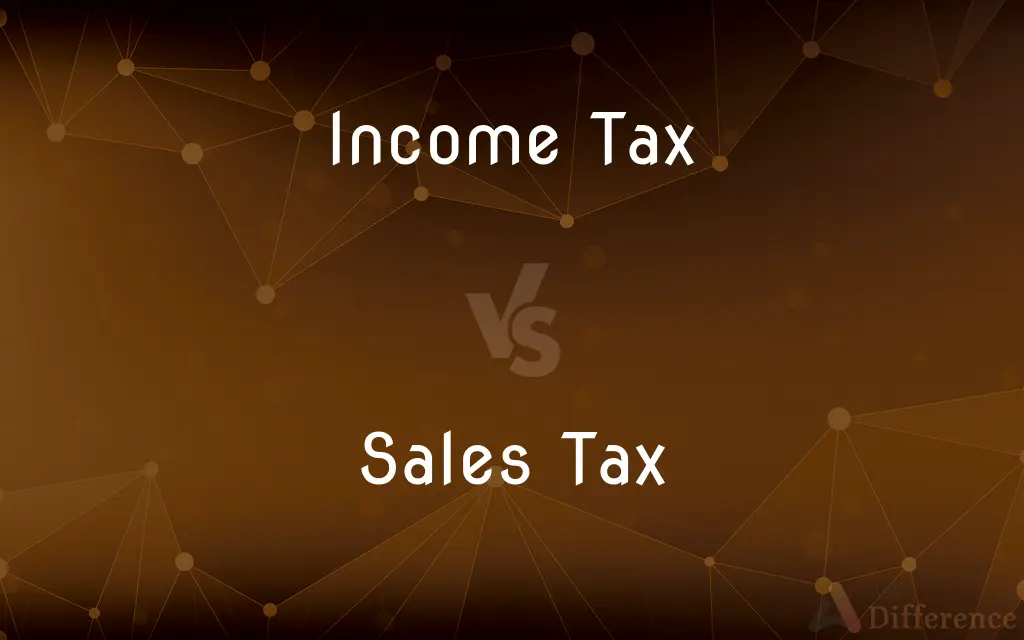Income Tax vs. Sales Tax — What's the Difference?
Edited by Tayyaba Rehman — By Maham Liaqat — Published on September 7, 2024
Income tax is levied on an individual's or entity's earnings, whereas sales tax is applied to the sale of goods and services. Income tax is progressive; sales tax is regressive, impacting consumers directly.

Difference Between Income Tax and Sales Tax
Table of Contents
ADVERTISEMENT
Key Differences
Income tax is charged on the income of individuals, corporations, and other legal entities. It is calculated based on the income earned over a year, with rates often progressive, meaning they increase as income rises. This system aims to ensure fairness by taxing higher earners at higher rates.
Sales tax, on the other hand, is a consumption tax imposed on the sale of goods and services at the point of purchase. It is typically a flat percentage of the transaction value and is added to the purchase price. Sales tax is considered regressive as it takes a larger percentage of income from lower-income individuals.
Income tax contributions are mainly used by governments to fund public services and infrastructure, relying on a structured system that considers an entity's ability to pay. This tax is fundamental to the operation of most modern economies, underpinning social services and government functions.
Sales tax revenues are also used for public expenditures but are collected in a way that directly impacts consumer behavior. By taxing goods and services, governments can influence spending and save for specific fiscal needs without directly impacting an individual's income.
The impact of income tax is felt directly by individuals and businesses through reduced disposable income or profits, which can affect savings and investment decisions. This direct deduction from earnings contrasts with sales tax, which consumers face indirectly when purchasing goods and services.
ADVERTISEMENT
Comparison Chart
Basis of Tax
Earnings (salary, profits, etc.)
Sale of goods and services
Rate Structure
Progressive (varies by income level)
Flat percentage of sale price
Impact
Directly reduces disposable income
Increases cost of purchases
Aim
Distribute tax burden based on ability to pay
Collect revenue on consumption
Regressivity
Less regressive (higher earners pay more)
Regressive (impacts lower earners more)
Compare with Definitions
Income Tax
Essential for funding government services.
Income tax revenues support public healthcare and education.
Sales Tax
Flat rate applied at the point of purchase.
Every purchase in the city includes a 5% sales tax.
Income Tax
Affects savings and investment decisions.
High income taxes can discourage personal savings.
Sales Tax
Influences consumer spending.
High sales tax rates can deter unnecessary spending.
Income Tax
A tax on individuals or entities' earnings.
John's income tax rate increases as his salary grows.
Sales Tax
Increases the cost of goods and services.
Sales tax makes buying a new car more expensive.
Income Tax
Progressive, with rates increasing with income.
The progressive income tax system ensures fairness.
Sales Tax
A tax on the sale of goods and services.
A 7% sales tax is added to your restaurant bill.
Income Tax
Deducted directly from earnings.
Her paycheck reflects deductions for federal income tax.
Sales Tax
Regressive, affecting low-income individuals more.
Sales tax consumes a larger portion of lower incomes.
Common Curiosities
How is income tax calculated?
Income tax is calculated based on earnings, with rates increasing progressively for higher income brackets.
Who pays sales tax?
Sales tax is paid by consumers when they purchase goods and services, collected by sellers.
What is sales tax?
Sales tax is a tax applied to the sale of goods and services, added to the consumer's purchase price.
Can income tax affect my savings?
Yes, income tax directly reduces disposable income, potentially affecting savings and investments.
How often do I pay income tax?
Income tax is typically paid annually, though deductions may occur throughout the year via payroll.
What is income tax?
Income tax is a tax on the money people or entities earn, which varies with the amount of income.
Does everyone pay the same sales tax rate?
Yes, the sales tax rate is the same for all consumers in a jurisdiction, regardless of income.
What are exemptions to sales tax?
Certain items, like groceries and prescription drugs, may be exempt from sales tax in some areas.
Can I reduce my income tax?
Yes, through deductions, credits, and tax-efficient investing, individuals can reduce their taxable income.
Why is sales tax considered regressive?
Sales tax is considered regressive because it takes a larger percentage of income from lower earners.
Do sales taxes fund specific projects?
Sales tax revenues can be earmarked for specific projects, like infrastructure or education, depending on the jurisdiction.
Is sales tax the same in every state?
No, sales tax rates vary by state and sometimes within local jurisdictions.
Is income tax fair?
Income tax is designed to be fair by taxing higher earners at higher rates, though perceptions of fairness vary.
Can businesses deduct sales tax?
Businesses can often deduct sales tax paid on business-related purchases as an expense.
What happens if I don't pay sales tax?
Failing to pay sales tax can result in penalties and legal action, similar to the consequences for evading income tax.
Share Your Discovery

Previous Comparison
Russell Viper vs. King Cobra
Next Comparison
To vs. WithAuthor Spotlight
Written by
Maham LiaqatEdited by
Tayyaba RehmanTayyaba Rehman is a distinguished writer, currently serving as a primary contributor to askdifference.com. As a researcher in semantics and etymology, Tayyaba's passion for the complexity of languages and their distinctions has found a perfect home on the platform. Tayyaba delves into the intricacies of language, distinguishing between commonly confused words and phrases, thereby providing clarity for readers worldwide.













































